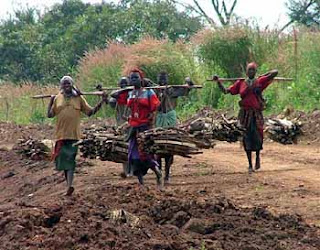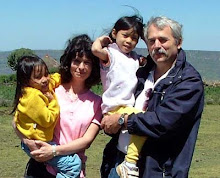 A little over a week ago I took a survey trip to the Gumuz area in Ethiopia. We were exploring the possible site of an agro-forestry project. The Gumuz are a people originating in the Sudan but spill across the border into Ethiopia. In the past they have been slaves of both Sudanese and Ethiopians. They are a primitive tribe still existing by hunting with bows and arrows and foraging for food.
A little over a week ago I took a survey trip to the Gumuz area in Ethiopia. We were exploring the possible site of an agro-forestry project. The Gumuz are a people originating in the Sudan but spill across the border into Ethiopia. In the past they have been slaves of both Sudanese and Ethiopians. They are a primitive tribe still existing by hunting with bows and arrows and foraging for food.The area they live in is fertile and also rich in minerals. It could be a very rich area but is extremely impoverished and the ecology is being destroyed. The Gumuz are killing all the natural wildlife in the area and are cutting down all the trees for charcoal, firewood and lumber.
 When they clear out one area they move to another.
When they clear out one area they move to another.The local church we are working with in Bahir Dar has been targeting this group for the past three years. Several of its members have been working out of a little town called Gilgel Beles. This is the regional centre for the Gumuz that are located north of the Nile (there is another group south of the Nile). They have established good relationships with several of the villages and meet weekly with about 150 of them under trees in the villages.
Here are some of the findings of our survey trip.
Malaria is the number one killer. More than 50% of deaths are caused by Malaria.
There is a high prevalence of malnutrition as their main diet consists of a slop made from millet with little else. It is one month after harvest and their storage bins are empty.
 Almost anything will grow in the area, however, fruit trees were all but non existent.
Almost anything will grow in the area, however, fruit trees were all but non existent.There used to be abundant wild life including elephants, wild pigs, cheetahs, leopards, deer, and many indigenous birds, however, the Gumuz have killed off most of the wild life.
The Gumuz are cutting down most of the trees in the area to sell as charcoal, firewood and lumber without any programs of reforestation.
The Gumuz have a long history of violence and inter-tribal fighting. Armed police are afraid to go into the area. This has prevented much being done in the way of development. Through recent efforts by groups and churches like KHC good contact and relationships have been established to the point they are now wanting to change their past ways for a better future.
 We are hoping to see an agro-forestry project established through KHC to address some of these concerns. We are also looking at the need for a more comprehensive health project to address some of the major health concerns.
We are hoping to see an agro-forestry project established through KHC to address some of these concerns. We are also looking at the need for a more comprehensive health project to address some of the major health concerns.University Students in Bahir Dar are back at school and we have kicked off the Big Brother/ Big Sister program this year. We are looking at increasing the numbers of participating students this year and have some practical ideas for the students to do that, Lord willing, will improve the life and future of the street kids.
Things continue well at the school I am teaching at and Sue continues to teach the girls at home.
